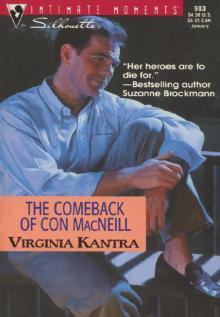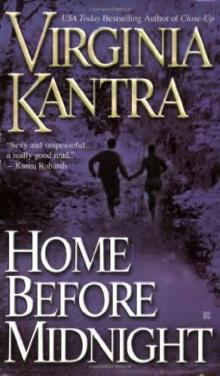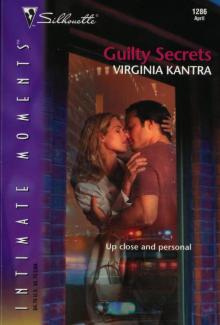- Home
- Virginia Kantra
Home Before Midnight
Home Before Midnight Read online
Table of Contents
Title Page
Copyright Page
Dedication
Acknowledgements
ONE
TWO
THREE
FOUR
FIVE
SIX
SEVEN
EIGHT
NINE
TEN
ELEVEN
TWELVE
THIRTEEN
FOURTEEN
FIFTEEN
SIXTEEN
SEVENTEEN
EIGHTEEN
NINETEEN
TWENTY
TWENTY-ONE
TWENTY-TWO
EPILOGUE
“Virginia Kantra is an up-and-coming star.”
—Karen Robards
“Kantra writes honest, intelligent romance . . .
smart, sexy, and entirely cool.”
—WRAL.com
Praise for
Close-Up
“Holy moly, action/adventure/romance fans! You are going to LOVE this book! I highly, highly recommend it.”
—New York Times bestselling author Suzanne Brockmann
“A story fraught with intense emotions and danger . . . Kantra clearly demonstrates that she’s a talent to be reckoned with.”—Romantic Times
“Kantra’s first foray into single-title fiction is fast-paced, engrossing, and full of nail-biting suspense.”
—New York Times bestselling author Sabrina Jeffries
More praise for
Virginia Kantra and her
bestselling novels
“Sexy fun! Virginia Kantra writes romantic suspense with a dash of humor, a dollop of intrigue, and a heavy dose of adventure.”—New York Times bestselling author Lisa Gardner
“Virginia Kantra’s stories . . . can make a believer out of the most hardened soul.”
—New York Times bestselling author Patricia Rice
“An involving, three-dimensional story that is scary, intriguing, and sexy.”—All About Romance
“Kantra creates powerfully memorable characters.”
—Midwest Book Review
“Virginia Kantra is an autobuy . . . her books are keepers and her heroes are to die for!”
—New York Times bestselling author Suzanne Brockmann
“Spectacularly suspenseful and sexy. Don’t miss it!”
—Romantic Times
THE BERKLEY PUBLISHING GROUP
Published by the Penguin Group
Penguin Group (USA) Inc.
375 Hudson Street, New York, New York 10014, USA
Penguin Group (Canada), 90 Eglinton Avenue East, Suite 700, Toronto, Ontario M4P 2Y3, Canada
(a division of Pearson Penguin Canada Inc.)
Penguin Books Ltd., 80 Strand, London WC2R 0RL, England
Penguin Group Ireland, 25 St. Stephen’s Green, Dublin 2, Ireland (a division of Penguin Books Ltd.)
Penguin Group (Australia), 250 Camberwell Road, Camberwell, Victoria 3124, Australia
(a division of Pearson Australia Group Pty. Ltd.)
Penguin Books India Pvt. Ltd., 11 Community Centre, Panchsheel Park, New Delhi—110 017, India
Penguin Group (NZ), Cnr. Airborne and Rosedale Roads, Albany, Auckland 1310, New Zealand
(a division of Pearson New Zealand Ltd.)
Penguin Books (South Africa) (Pty.) Ltd., 24 Sturdee Avenue, Rosebank, Johannesburg 2196,
South Africa
Penguin Books Ltd., Registered Offices: 80 Strand, London WC2R 0RL, England
This is a work of fiction. Names, characters, places, and incidents either are the product of the author’s imagination or are used fictitiously, and any resemblance to actual persons, living or dead, business establishments, events, or locales is entirely coincidental. The publisher does not have any control over and does not assume any responsibility for author or third-party websites or their content.
HOME BEFORE MIDNIGHT
A Berkley Sensation Book / published by arrangement with the author
PRINTING HISTORY
Berkley Sensation mass-market edition / August 2006
Copyright © 2006 by Virginia Kantra
All rights reserved.
No part of this book may be reproduced, scanned, or distributed in any printed or electronic form without permission. Please do not participate in or encourage piracy of copyrighted materials in violation of the author’s rights. Purchase only authorized editions.
For information, address: The Berkley Publishing Group,
a division of Penguin Group (USA) Inc.,
375 Hudson Street, New York, New York 10014.
eISBN : 978-1-101-01006-8
BERKLEY SENSATION®
Berkley Sensation Books are published by The Berkley Publishing Group,
a division of Penguin Group (USA) Inc.,
375 Hudson Street, New York, New York 10014.
BERKLEY SENSATION and the “B” design are registered trademarks of Penguin Group (USA) Inc.
http://us.penguingroup.com
For Michael
I always say I couldn’t do it without you, darling.
Now you know it’s true.
ACKNOWLEDGMENTS
Special thanks to all the people who took time from their important jobs and busy lives to answer my questions patiently and correctly, especially Lt. A.J. Carter (Ret.), criminal investigation, Durham Police Department; my sister-in-law, retired corrections officer Virginia Grisez (how would I have come up with that plot point without you?); my sister, nurse extraordinaire, Pamela Archbold; financial adviser Fred D. Gunther; estate attorney Kevin Stroud; and the Office of the Chief Medical Examiner in Chapel Hill. Everything I got right is because of their generous help. Everything I got wrong is my own fault.
Thanks to Judith Stanton and all the members of Heart of Carolina—you know who you are!—for your ongoing support.
Thank you, Jean, Drew, and Mark, for living through my deadlines with me.
And deepest thanks to Cindy Hwang, to Damaris Row-land, and to Melissa McClone for helping me make this book the best it could be.
ONE
MARCH 14, 1987
Stokesville, NC—A seventeen-year-old denied admittance to his high school dance stabbed his mother, grandmother, and sister to death on Friday night, authorities said.
The youth, identified Sunday as Billy Ray Dawler, is a sophomore at Jefferson High School. School officials and police said the teen was apparently under the influence of alcohol.
Police were informed of the stabbings early Saturday morning by an anonymous caller. Detectives discovered the bodies of Shirley Dawler, 49, Tammy Dawler, 33, and Tanya Dawler, 15, at the family’s home at 543 White Pine Road. Neighbors report frequent late-night visitors to the modest brick bungalow, but no witnesses for that evening have come forward.
BAILEY Wells shivered. And she thought she had issues in high school.
Dropping the microfiche printout on her bed, Bailey lifted her heavy brown hair off her neck. Outside her window, a willow drooped, pale in the moonlight, listless in the heat.
For better or worse, there was no place like home. And nothing hotter or lonelier than a Carolina summer night.
Even with the windows locked and the thermostat lowered to sixty-five degrees, the air gripped the house like a warm, damp fist. The grinding whine of the cicadas swelled the night and buzzed in her blood. She had to be crazy to leave New York—the exciting career opportunities, the sophisticated nightlife, her cozy studio apartment—for this.
Not crazy. The thought slipped in like a breeze under the windowsill, stirring her mood. In love.
Bailey flushed and dropped her hair. No, that wasn’t right, either.
Anyway, she
could admit—to herself and the cicadas, at least—the career thing hadn’t gone exactly as planned. She had hoped her job as personal assistant to a bestselling crime writer would give her a break from tweaking other people’s manuscripts and the time and motivation to work on her own. But after two years of working for Paul Ellis, she was no closer to submitting her own novel. Oh, admit it. She wasn’t even writing.
As for her nightlife . . . She had burned out on bars and blind dates. She was sick of guys who were never as young or as tall, as emotionally available or financially stable as their on-line profiles promised. She was tired of drinking bad wine and cheap beer to blur the edges of her evenings, thankful she didn’t generally wake up with anything worse than a headache. Most nights she chose to spend alone in her fourth-floor East Village walk-up, watching Friends reruns and throwing shoes at whatever scuttled from beneath the minifridge.
At least the cicadas made a change from cockroaches.
She stared out at the moon-dappled lawn and the fancy new streetlights of the town where she’d once been voted Most Likely to Leave. She hadn’t given up, she told herself. Not yet. She’d just . . . grown up.
Enough to come home.
Paul had broken the news. “I would never insist that you come with us,” he had said, with one of his special looks. “But this new book is a wonderful opportunity for you. And you’re from around there, aren’t you? Stokesville, North Carolina? You probably even remember the Dawler killings. It was quite a scandal at the time.”
Nineteen years ago.
“I was seven,” Bailey said. “Maybe your wife—”
His wife of five years was Helen Stokes Ellis, a wealthy Magnolia-in-exile who preferred her bourbon on the rocks and her relatives at a distance.
Paul shrugged dismissively. “You know Helen never reads the paper. Or pays attention to the news, if she can help it.”
Bailey squashed the satisfaction she felt at his small disloyalty. “But she’s from the area. I mean, the town is named after her family. She knows people.”
“But she doesn’t understand my work. I want you, Bailey.”
Bailey’s heart beat a little faster.
“We both want you,” he had added. “Helen will be glad for the company, and I need your help with this book.”
Bailey doubted Helen would deign to notice her existence. But it was irresistible to be needed. To be valued for something other than her ability to attract and keep the right man. The “right man,” as defined by Bailey’s mother, being any white, single, thirty-year-old, Methodist, Southern professional.
Maybe Paul didn’t meet her mama’s specifications.
Maybe he didn’t feel Bailey’s writing was ready to show anyone else yet.
But he needed her. He’d said so.
After the move, he’d even insisted she make her home with them, with Paul and Helen, in Helen’s house. God knew, he had said with a droll look, there was enough room.
The old Stokes place had been built in the 1930s for a large and prosperous family. The sweeping verandas and imposing columns in front were balanced by two thoroughly modern additions in back, the master suite and a kitchen-and-dining wing, flanking an artfully landscaped swimming pool.
Bailey had her own room and bathroom in the original part of the house, with high ceilings and heavy wood trim that more than made up for the uneven floors and cramped shower. Maybe she didn’t have a view of the pool, but she was welcome to use it whenever Helen wasn’t entertaining or sunbathing or, well, there.
She wouldn’t be there now, Bailey thought, glancing at the clock. It was almost midnight. On her “at home” nights, Helen went to bed early and fell asleep with the television on. No one would notice, no one would care, if Bailey snuck down to the kitchen and fixed a snack to eat by the pool.
Unless Paul was up, working.
Bailey pushed the thought away.
She made her way downstairs in the dark, refusing even to look in the direction of his study to see if his lights were on. All she wanted was to sit by the pool and watch the cool gleam of the water and the bugs committing suicide in the patio lights while she smothered her restlessness in ice cream. Stress eating, Dr. Phil called it. Ask yourself what you really want.
She knew what she wanted.
And what she couldn’t have.
Ice cream was better. Safer.
In the kitchen, she dug deep into a round carton of Edy’s butter pecan. The heaped ice cream looked lonely in the bowl, so she added sliced strawberries and then a squeeze of chocolate syrup and then—on impulse—a second spoon.
Two-fisted eater? her conscience mocked.
She ignored it. Carrying her spoils, she slid open the patio door, flipped on the lights . . . and froze. Apprehension squeezed her chest. Something big drifted below the surface of the water, dark against the submerged lights. Something big and dark, with floating hair.
Bailey took a step forward, dread backing up in her lungs.
Helen was not in her room.
She was in the pool. Facedown, at the bottom. Faint, dark swirls curled upward through the luminous blue water.
Bailey’s bowl slipped from her hands and shattered against the Mexican tile.
LIEUTENANT Steve Burke hadn’t worked the graveyard shift since he was a wet-behind-the-ears detective. Most investigative work took place during the day, when folks were awake and around to talk to. But in a small department, rank was no protection against a shit assignment. Somebody had to be on call through the midnight hours, and it was usually the new guy. Steve didn’t mind. It meant flextime, some time to spend with Gabrielle.
Of course, Gabby wouldn’t be happy if she woke and found him gone, but he’d left a note. With any luck, he’d be back before breakfast.
He pulled up the long drive and parked his truck behind an ambulance and a pair of black-and-whites. The big house was lit up like the folks inside were giving a party, which, from what he’d heard, wouldn’t have been unusual. Not that he’d ever been invited. He grimaced and got out of the truck, grabbing his kit from the passenger seat. Helen Stokes Ellis might have married a man who was Not From Around Here, as folks delicately and pointedly referred to Yankees. But now that she was back home, she didn’t socialize with people who were Not Her Kind.
Steve had never met Paul Ellis, the husband, but he’d heard stories about him, too. The briefing room was thicker with gossip than the barbershop or his mother’s Wednesday morning Bible group. Ellis was a real pain in the ass. He’d recently pissed off the chief of police by implying that his department had railroaded a murder investigation twenty years ago.
It was all before Steve’s time, but his sympathies were with the department. He had no patience with self-styled experts. And no reason to believe Ellis wouldn’t be equally critical of the police’s handling of his wife’s death.
No wonder the patrol officer on duty tonight had been anxious to pass the buck to Steve.
Steve prowled up the walk, carrying his kit. Yellow crime scene tape was strung around the house like bizarre party decorations. That would get the neighbors’ attention in the morning. How long, he wondered, before the press showed up? Not just the local press, either, the papers from Raleigh and Durham and even Charlotte. Paul Ellis was a bestselling true crime writer. His wife was a wealthy older woman who’d spent years maneuvering on the social pages. This case had the potential to blow up in Steve’s face. And the explosion could attract national media attention.
His lucky night. There were guys already grumbling over Steve’s hiring, detectives with more seniority who’d be only too happy to accuse him of hogging the limelight . . . or point their fingers if he screwed up.
Raising the yellow tape over his head, he walked in through the open front door.
Uniforms clustered at the other end of the long hallway. Beyond them, an arch opened up on some big room walled with glass. He’d get sketches and photographs of the layout later. For now, he focused on Wayne Lewis, the respon
ding officer. Lewis, a fresh-faced rookie, was young enough not to resent him, and hadn’t known him long enough to dislike him.
“What happened?” Steve asked quietly.
Lewis cleared his throat. “The homeowner—Helen Stokes?—was found drowned in the pool.”
The majority of drownings were accidental. Most involved the use or abuse of alcohol.
“And you called me because . . . ?”
Lewis turned red to the tips of his big ears. “The victim was fully clothed and has swelling and a slight laceration on the back of her head. She could have slipped and hit her head on the side of the pool as she fell. Or . . .”

 Meg and Jo
Meg and Jo All a Man Can Do
All a Man Can Do THE COMEBACK OF CON MACNEILL
THE COMEBACK OF CON MACNEILL All a Man Can Be
All a Man Can Be MAD DOG AND ANNIE
MAD DOG AND ANNIE![Dare Island [2] Carolina Girl Read online](http://i1.bookreadfree.com/i/03/26/dare_island_2_carolina_girl_preview.jpg) Dare Island [2] Carolina Girl
Dare Island [2] Carolina Girl Forgotten Sea
Forgotten Sea Sea Lord
Sea Lord THE PASSION OF PARICK MACNEILL
THE PASSION OF PARICK MACNEILL All a Man Can Ask
All a Man Can Ask Home Before Midnight
Home Before Midnight Family Secrets: Books 5-8
Family Secrets: Books 5-8 Carolina Dreaming: A Dare Island Novel
Carolina Dreaming: A Dare Island Novel Carolina Home
Carolina Home GUILTY SECRETS
GUILTY SECRETS Carolina Blues
Carolina Blues Carolina Man
Carolina Man Carolina Man (A Dare Island Novel)
Carolina Man (A Dare Island Novel) STOLEN MEMORY
STOLEN MEMORY Carolina Heart
Carolina Heart Immortal Sea
Immortal Sea THE TEMPTATION OF SEAN MCNEILL
THE TEMPTATION OF SEAN MCNEILL Sea Fever
Sea Fever